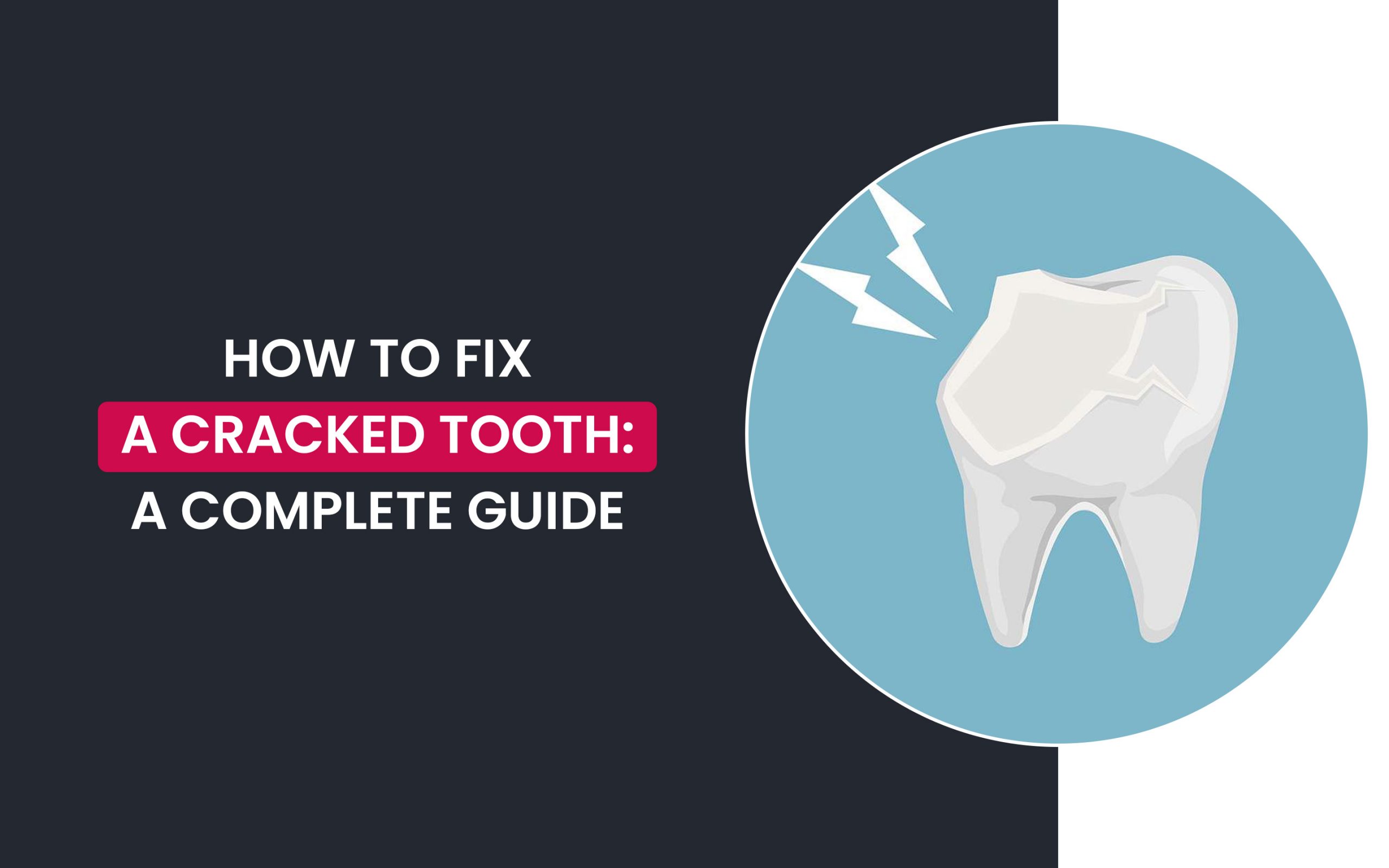A cracked tooth happens when the tooth’s structure undergoes a fracture or break. From minor surface cracks in the enamel to more extensive fractures reaching the tooth’s root, this condition can be detected with symptoms such as tenderness, sensitivity to temperature, discomfort while chewing, and occasional, challenging-to-pinpoint pain. Dental assessment is commonly undertaken to establish an appropriate treatment strategy. Depending on the extent and location of the crack, potential treatments encompass extraction, root canal therapy, bonding, fillings, or crowns.
In this blog, we will break down the complexities of dealing with cracked teeth. We’ll also explore the signs, evaluations, and ways to treat this dental issue, offering a clear understanding of how to keep the teeth healthy and functional along with highlighting the importance of timely awareness and action for a strong and pain-free smile.
Table of Contents
Chipped tooth vs Cracked tooth
A chipped tooth typically involves a small piece of enamel breaking off and can often be addressed with cosmetic procedures. On the other hand, a cracked tooth is a more serious condition that may require varying levels of intervention, depending on the depth and location of the crack. Seeking prompt dental attention is crucial for an accurate diagnosis and appropriate treatment. Here’s a brief overview of the distinctions between a chipped tooth and a cracked tooth.
Chipped tooth:
A chipped tooth, resulting from enamel breakage, can vary in severity from minor cosmetic issues to noticeable jagged edges. Causes include trauma, biting on hard objects, and wear over time, especially with existing dental problems. Symptoms include visible damage, temperature sensitivity, and discomfort while chewing. Treatment options range from no immediate intervention for minor chips to dental bonding or veneers for aesthetic restoration. More extensive chips may require a dental crown for added support. Prompt dental care ensures accurate diagnosis and tailored treatment for the specific nature of the chipped tooth.
Cracked tooth:
A cracked tooth involves a substantial break beyond the enamel, with varying depths that may not always be visible. Causes include trauma, teeth grinding (bruxism), large fillings weakening the tooth, and repeated temperature changes. Symptoms encompass pain during biting or chewing, sensitivity to temperature, and intermittent discomfort. Treatment depends on the crack’s depth and location, with dental bonding for superficial cracks, dental crowns for more extensive ones, and, in severe cases, root canal treatment to address pulp damage. Read More about Root Canal Treatment. Seeking timely dental care is crucial for accurate diagnosis and appropriate intervention.
Here's a simplified breakdown of fixing a cracked tooth
1. Assessment by dentist: Your dentists use tools like X-rays to assess the size and position of the crack.
2. Treatment options: Your treatment depends on the severity of the crack. Small cracks may be sealed or polished and for serious cracks your dentist may ask for placing a cap or a root canal to prevent infection.
3. Dentist’s procedure for fixing: For small cracks, dentists may use a tooth-colored material to seal them. Serious cracks may be addressed by covering the tooth with a protective cap or by root canal treatment.
4. Support for healing
- Dentists may use small supports on nearby teeth to aid the recovery of the cracked tooth.
- Decisions on support are based on factors like crack size, location, patient comfort, and overall dental health
5. Regular check-ups: Regular dental visits are crucial for early detection of small cracks, preventing them from worsening.
Preventive measures to Protect teeth from cracks

Prevention is crucial in avoiding dental issues like cracked teeth. Some preventive measures include:
- Avoiding hard foods: Restrict the complex materials you chew on to avoid possibly breaking the teeth.
- Wearing mouth guards: It is an excellent way to protect your teeth from potential harm when participating in sports. Routine dental exams are required to spot tooth decay and possible problems early on.
In summary, addressing a broken tooth promptly is crucial to prevent more discomfort and complications. Seeking immediate dental attention upon suspecting a fractured tooth is vital for swift and accurate diagnosis and treatment, ensuring optimal oral health.
Paradise Ridge Family - Your trusted partner in dental care
A trustworthy dental provider is essential when treating dental issues like broken teeth. The skilled dentists at Paradise Ridge dentistry recognize the need for prompt and efficient dental care. Our skilled team of experts is committed to offering individualized solutions to improve oral health. We at Paradise Ridge Family are experts at treating a wide range of dental conditions, including broken teeth.
Our clinic offers emergency care for broken teeth when it matters most to deliver prompt comfort and answers. Our extensive services address every facet of dental health, from preventive care to root canal therapy and dental crowns in Phoenix for chipped teeth.
Visit Paradise Ridge Family today and experience top-notch dental care for your cracked tooth concerns. Keep your teeth healthy, and don’t compromise on your smile—let us assist you. Make the initial move towards a more radiant grin! Please make an appointment with Paradise Ridge Family so our professionals can address your issues with fractured teeth. The finest treatment is what your smile deserves!
Recall that oral health depends on taking quick care of a cracked tooth. Don’t be afraid to get professional assistance to guarantee a stunning, healthy smile for years to come!


